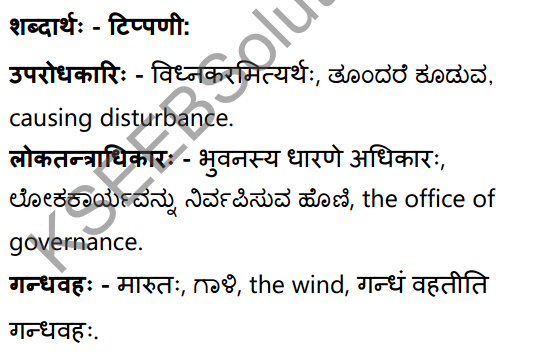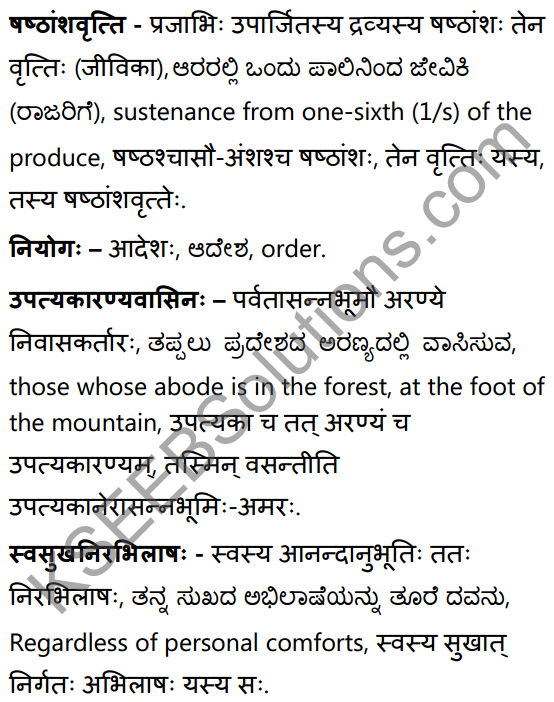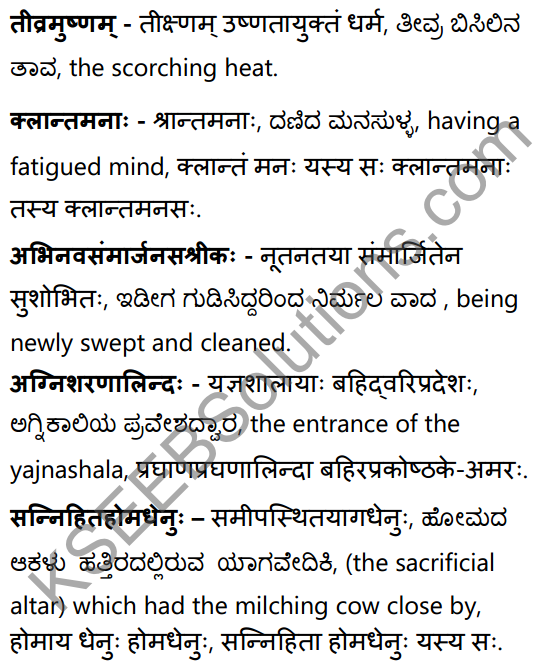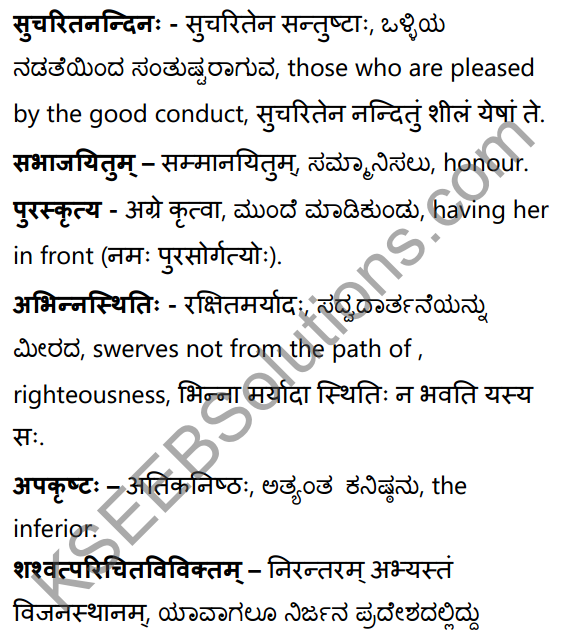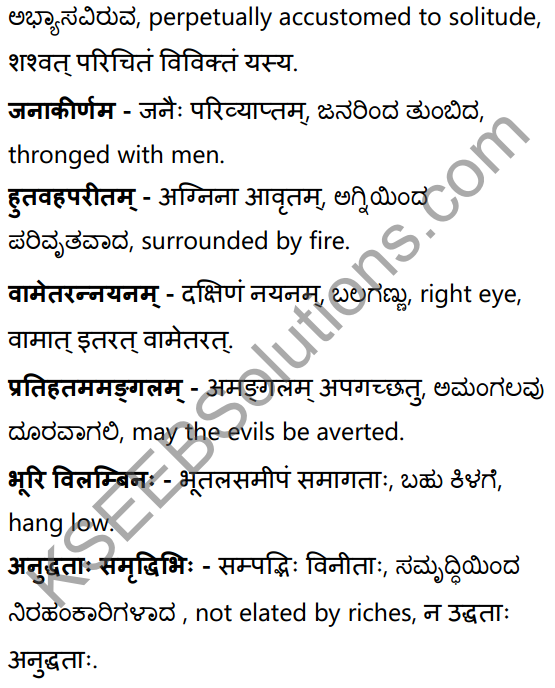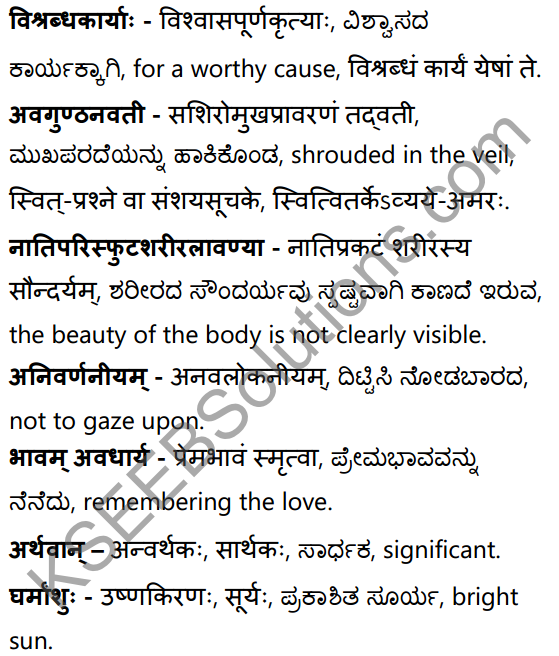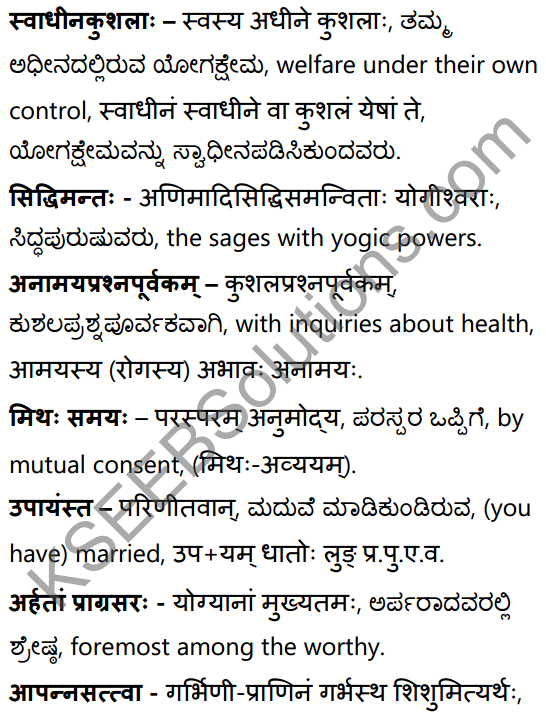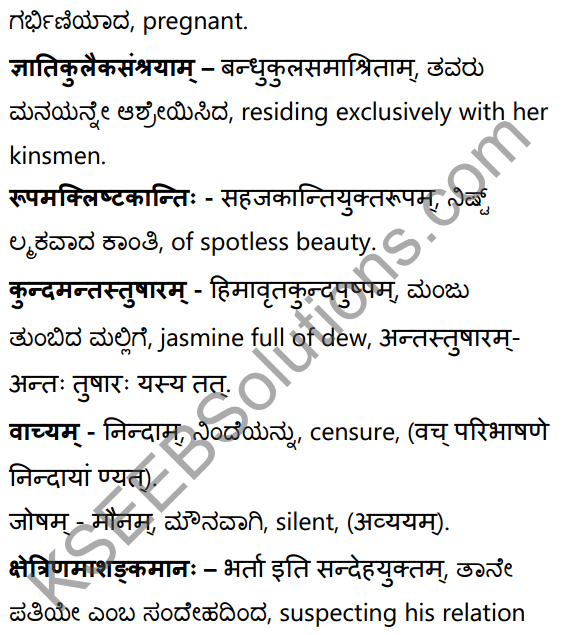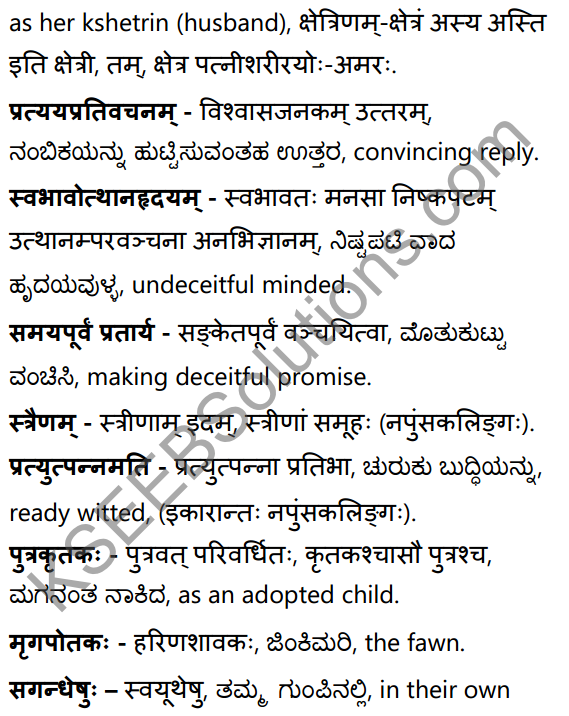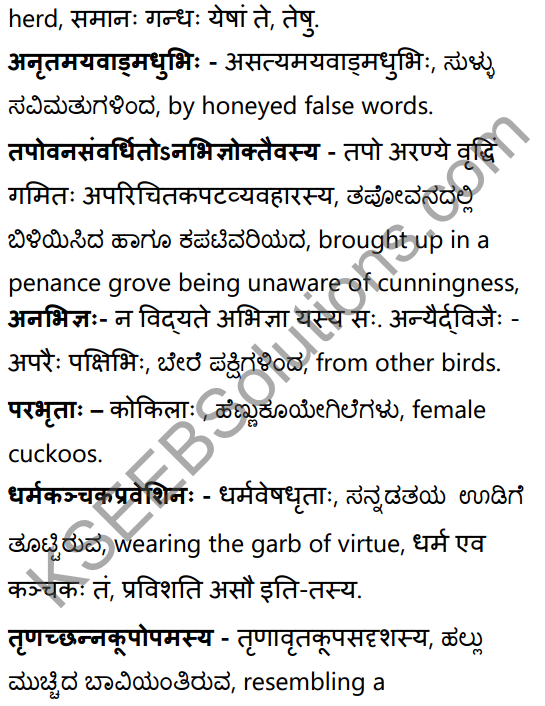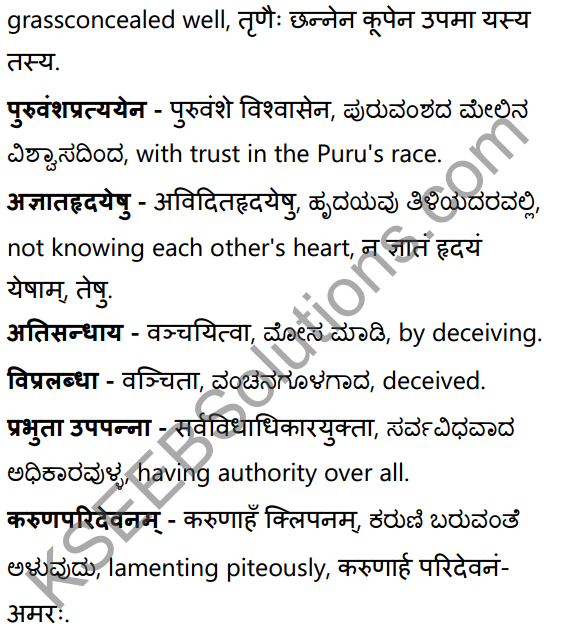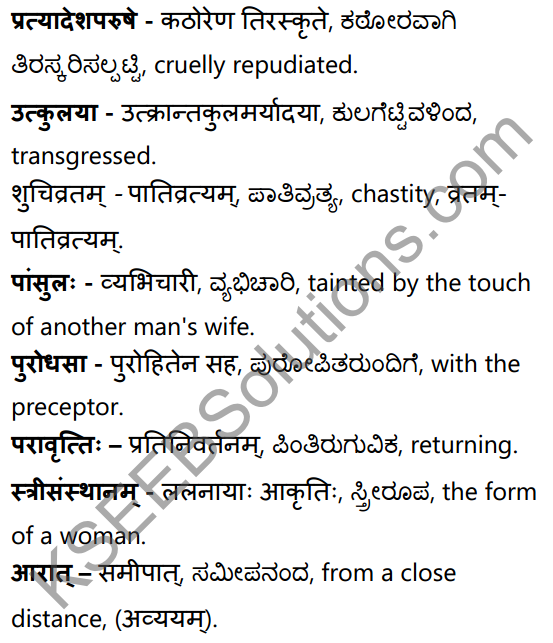Students can Download Sanskrit Shevadhi Lesson 4 शून्या मेऽङ्गुलिः Questions and Answers, Notes Pdf, Summary, 2nd PUC Sanskrit Textbook Answers, helps you to revise complete Karnataka State Board Syllabus and score more marks in your examinations.
Karnataka 2nd PUC Sanskrit Textbook Answers Shevadhi Chapter 4 शून्या मेऽङ्गुलिः
शून्या मेऽङ्गुलिः Questions and Answers, Notes, Summary
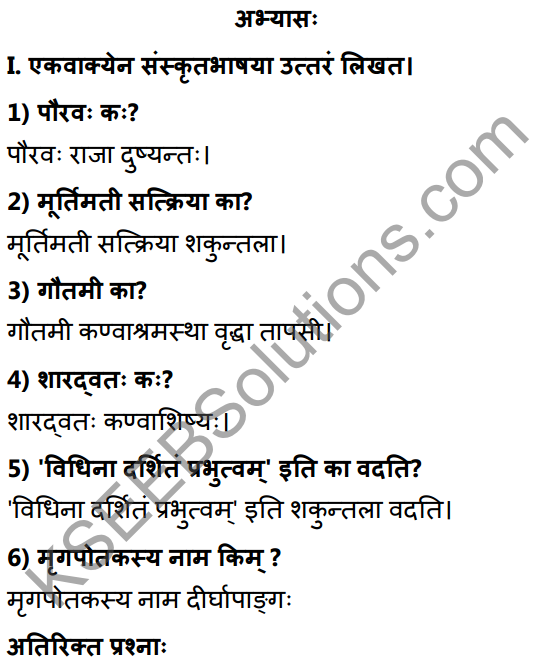
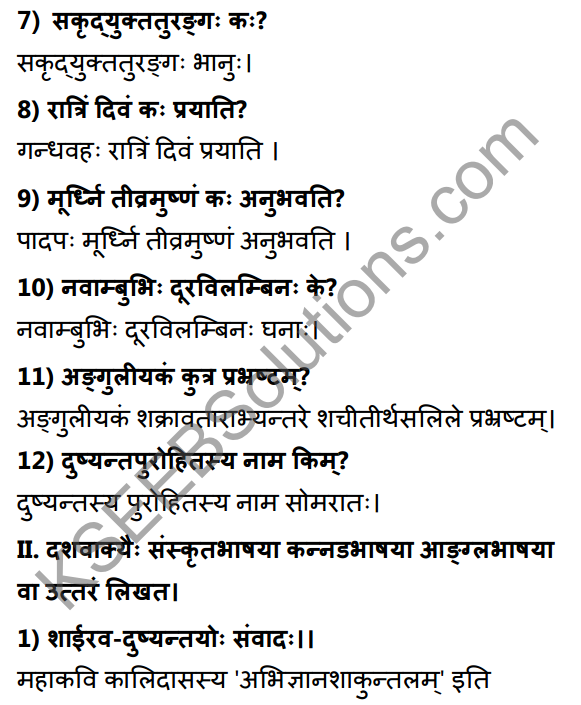
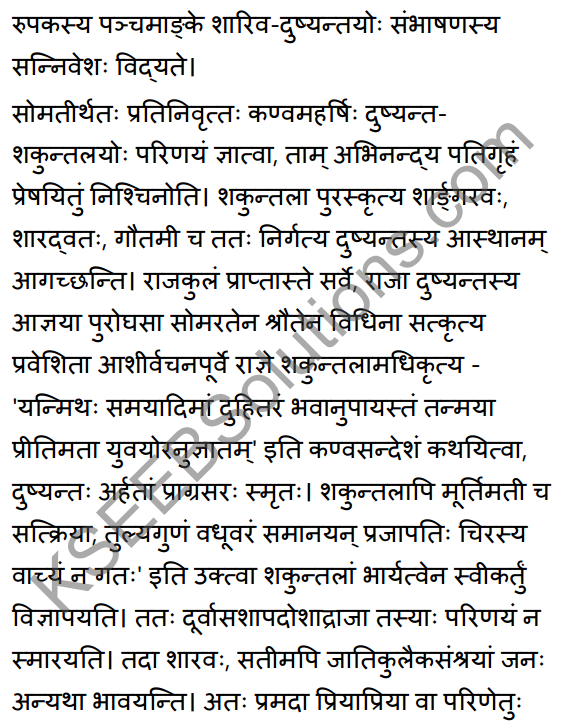
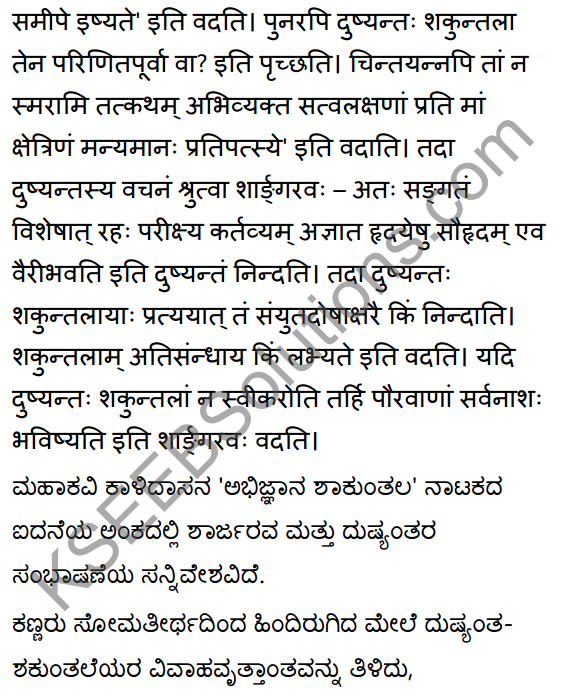
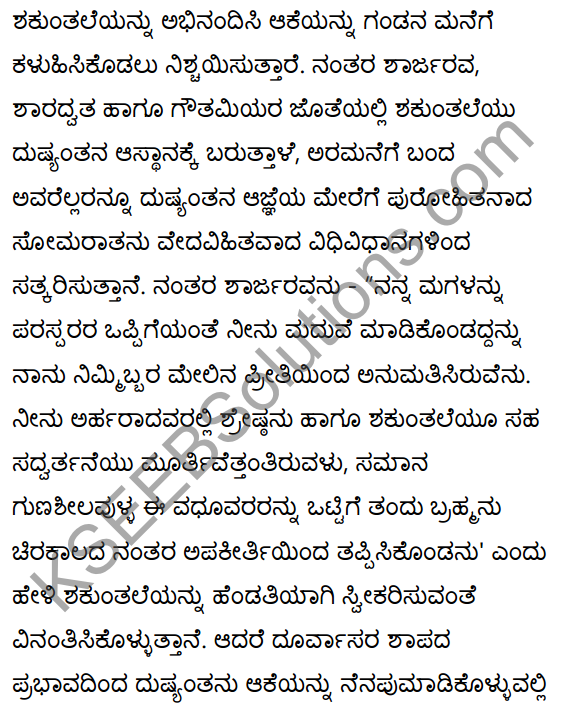
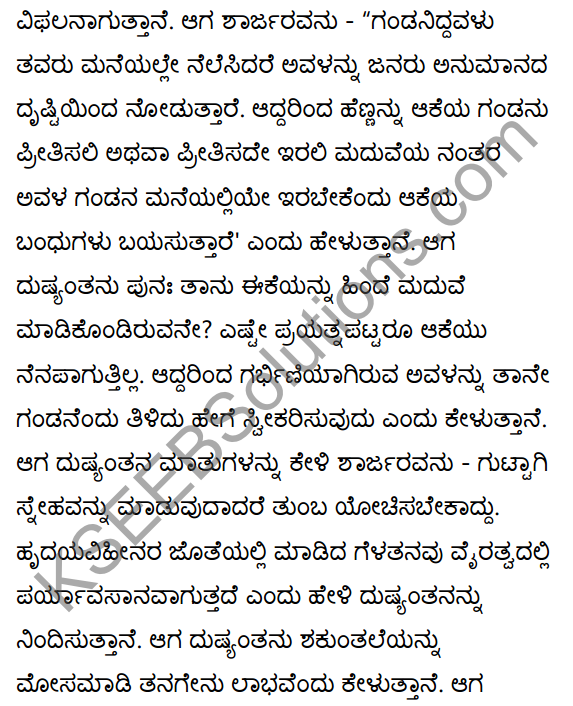
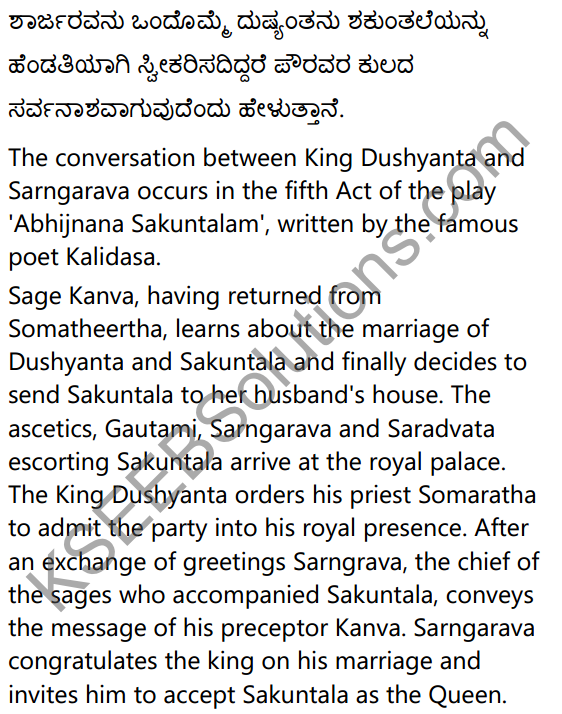
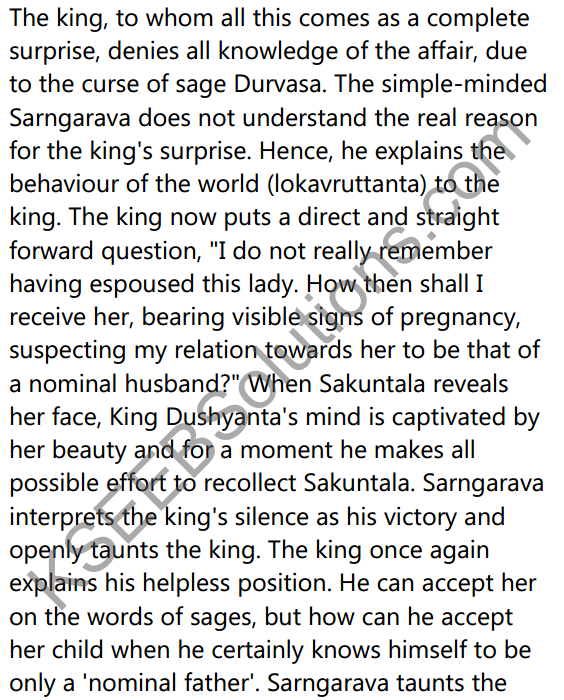
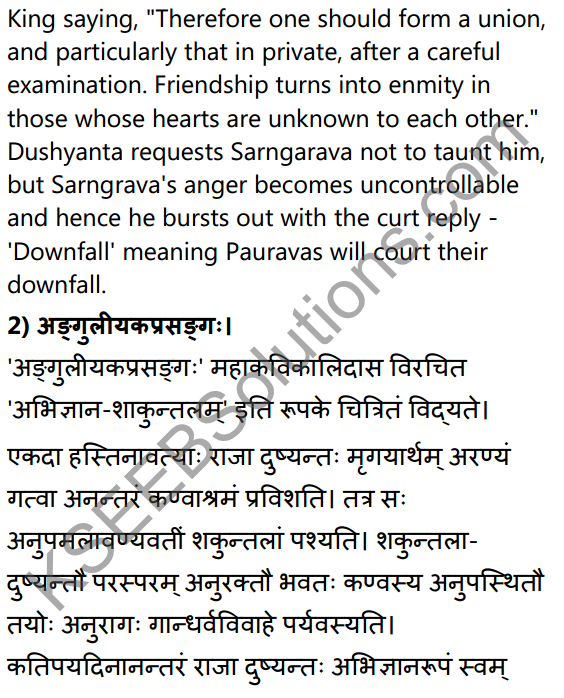
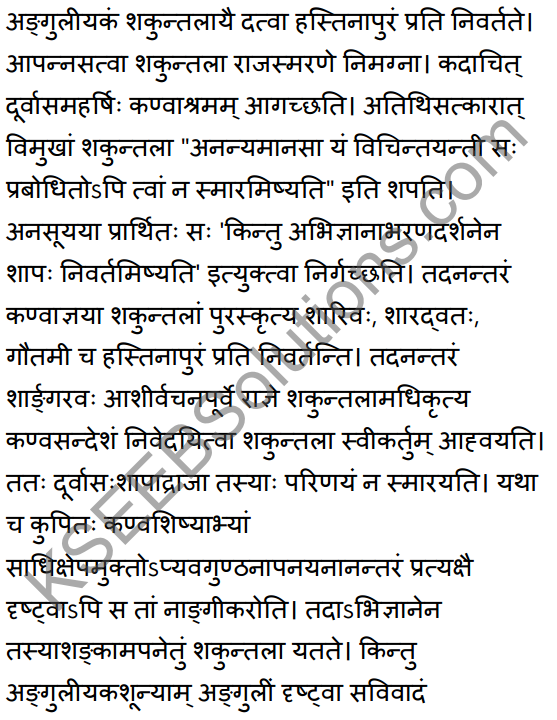
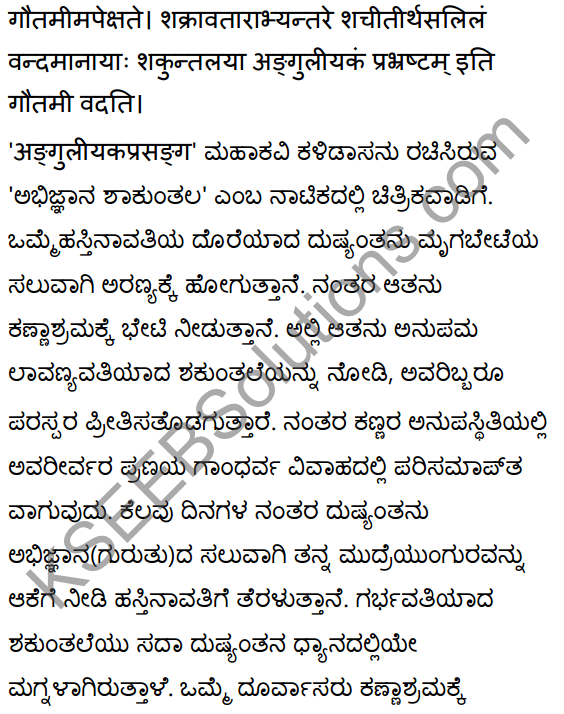
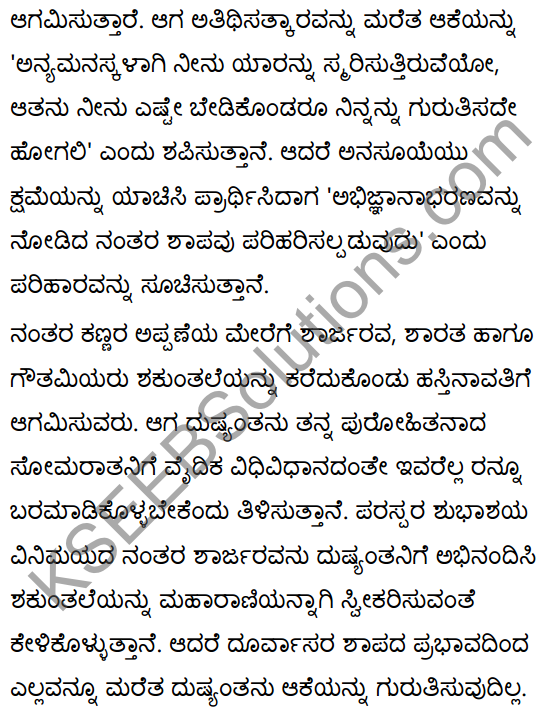
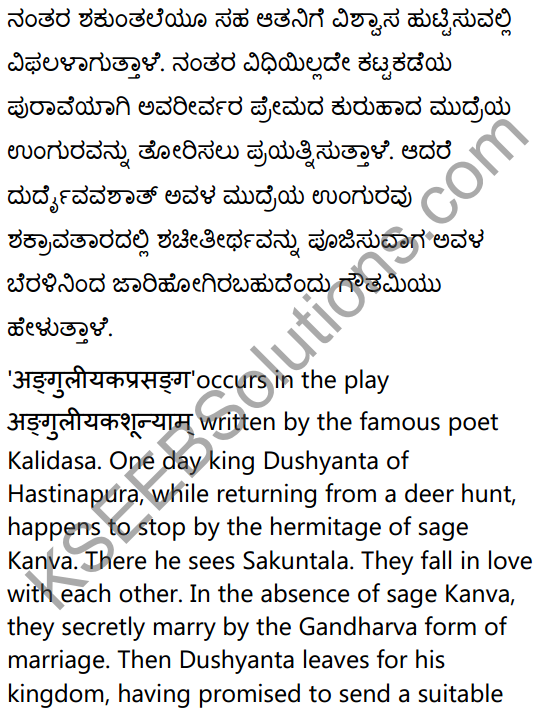
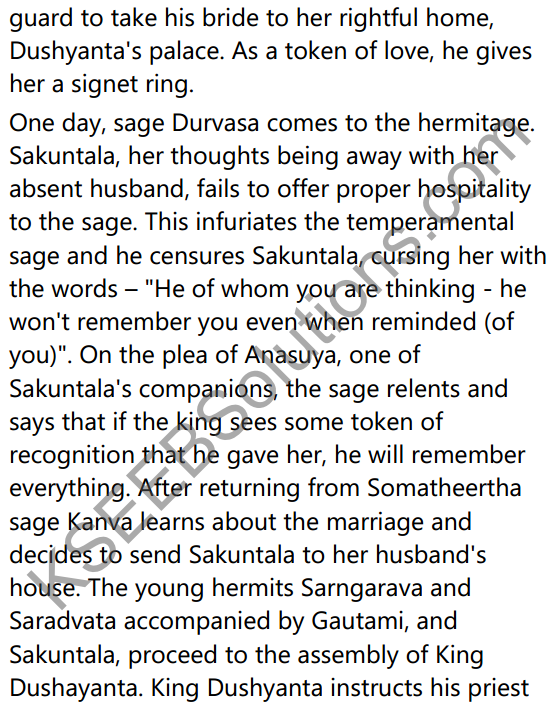
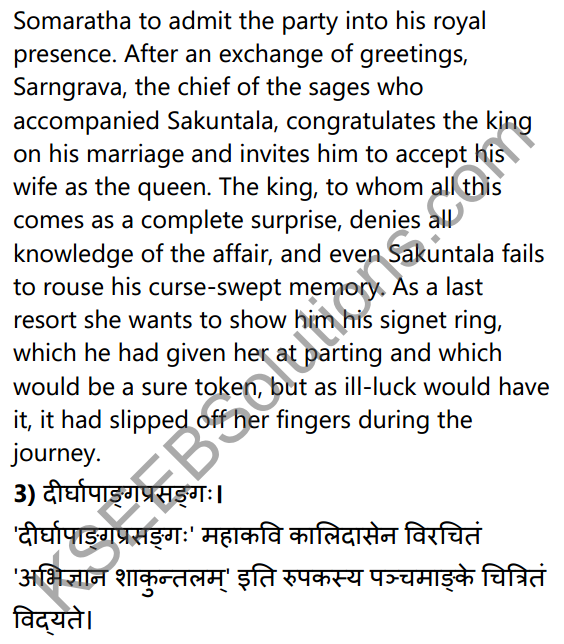
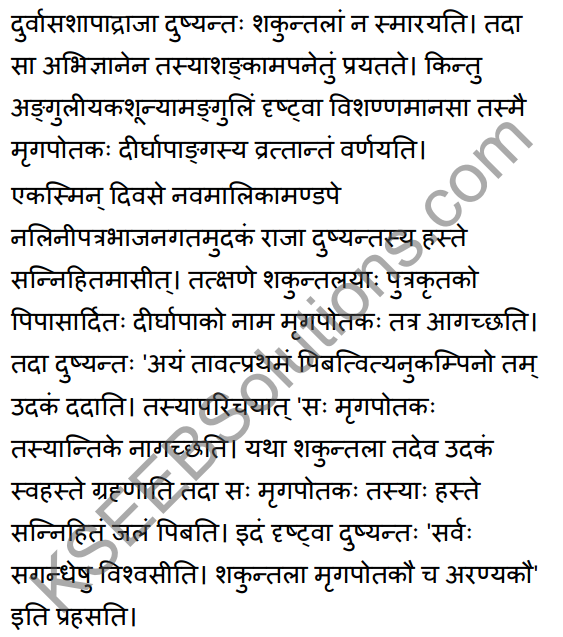
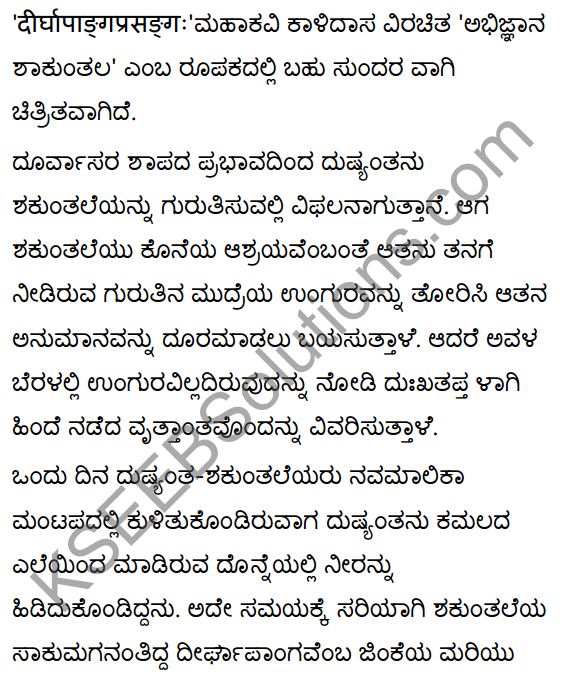
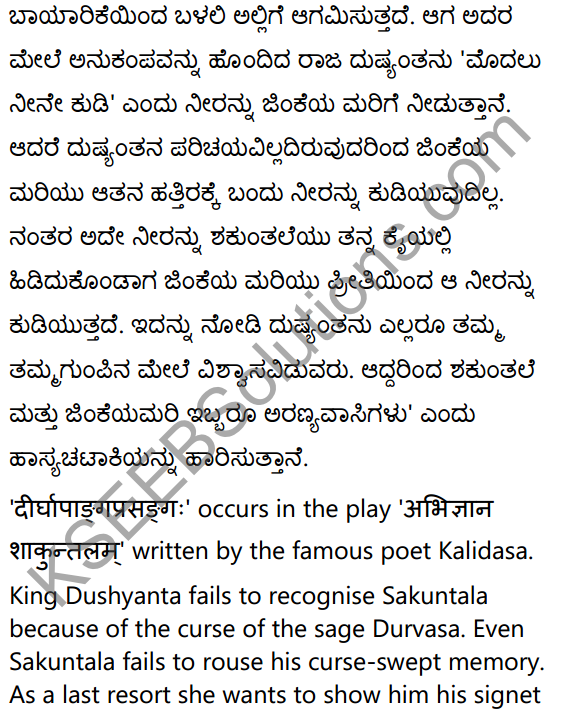
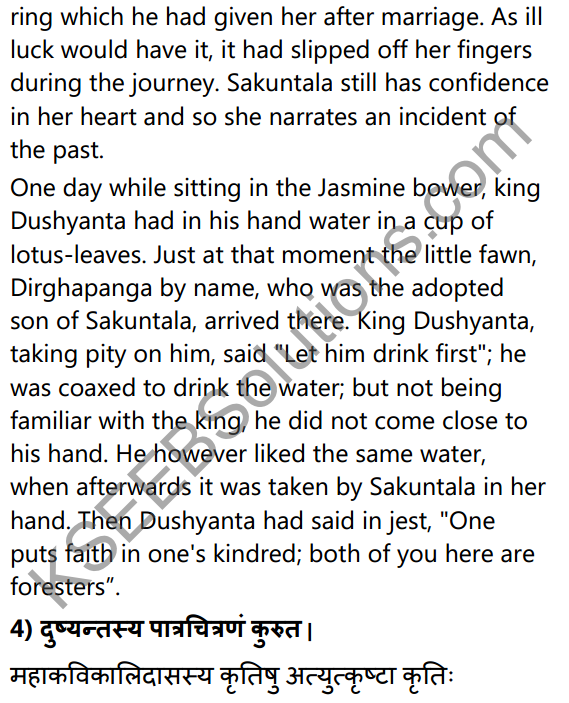
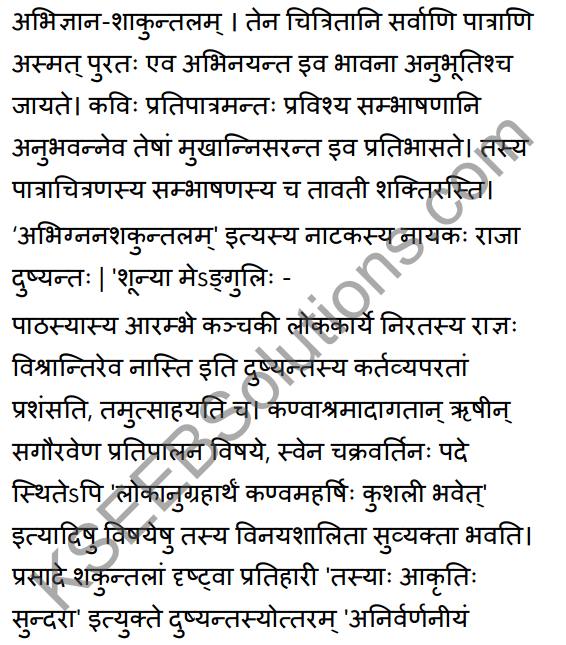
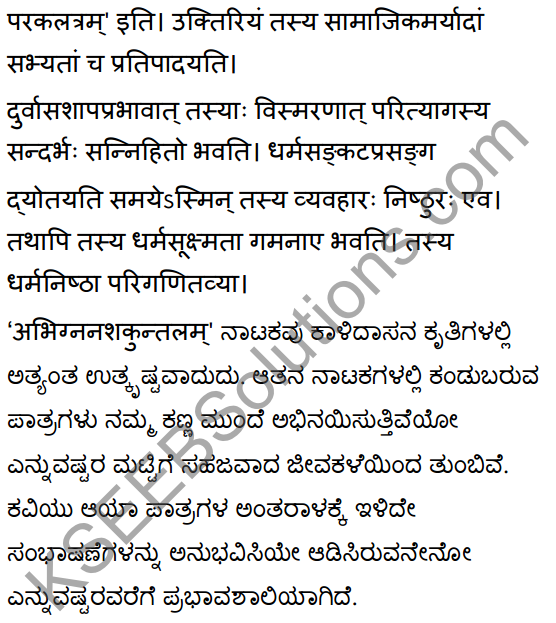
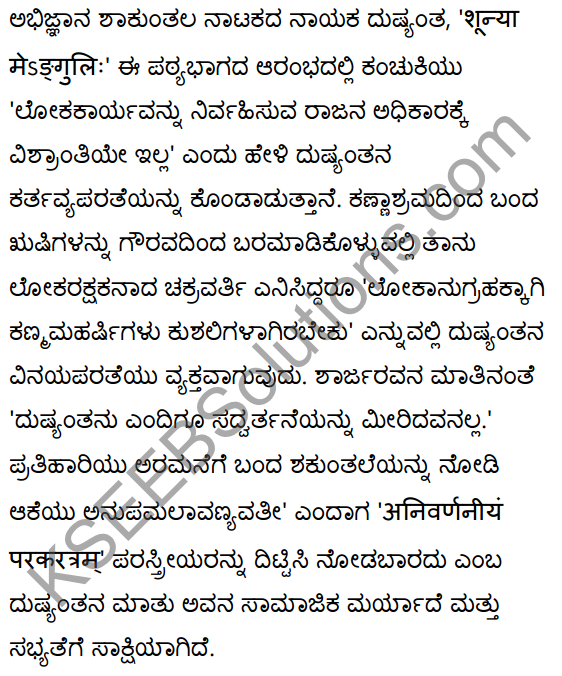
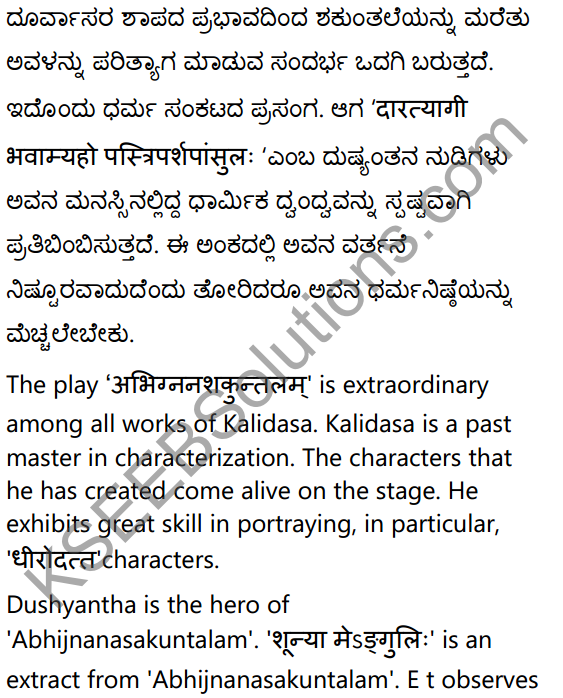
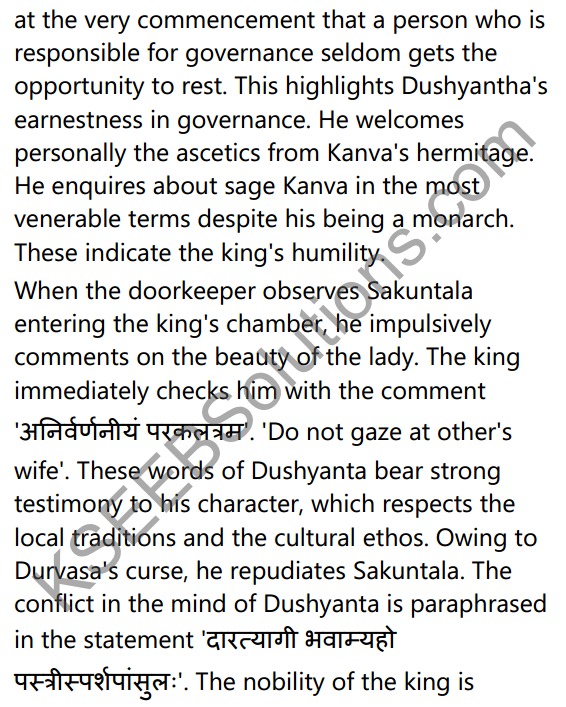
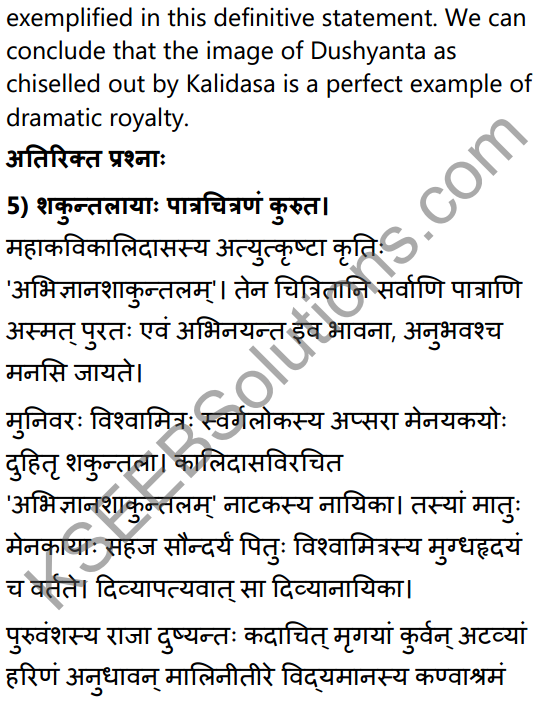
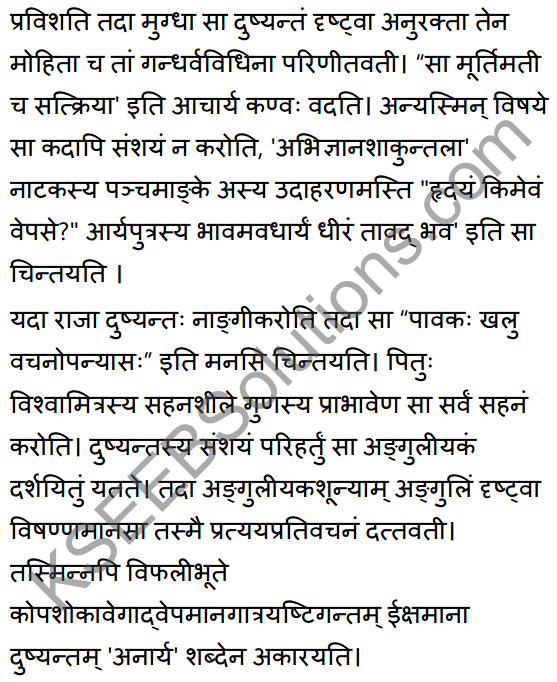
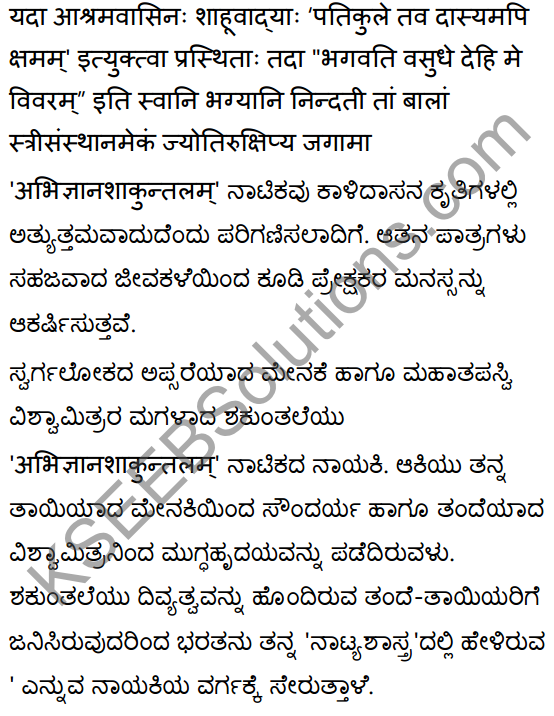
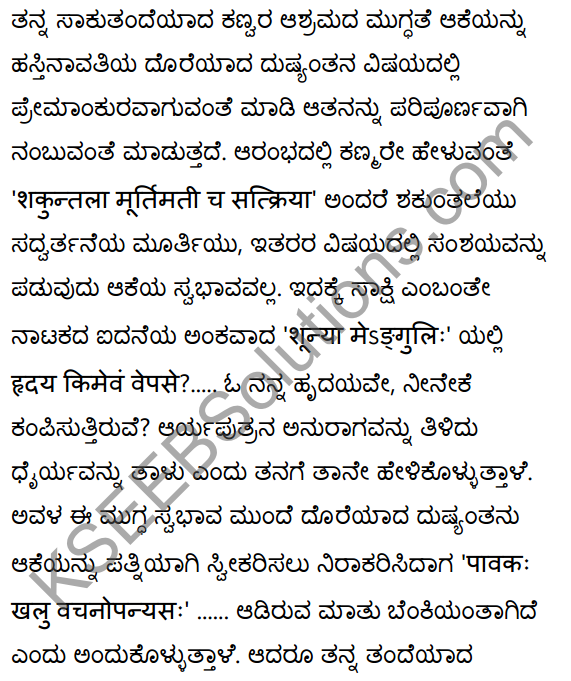
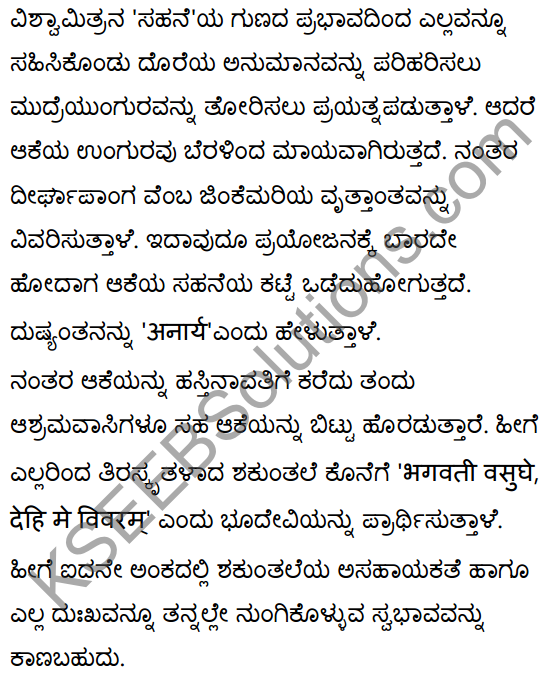
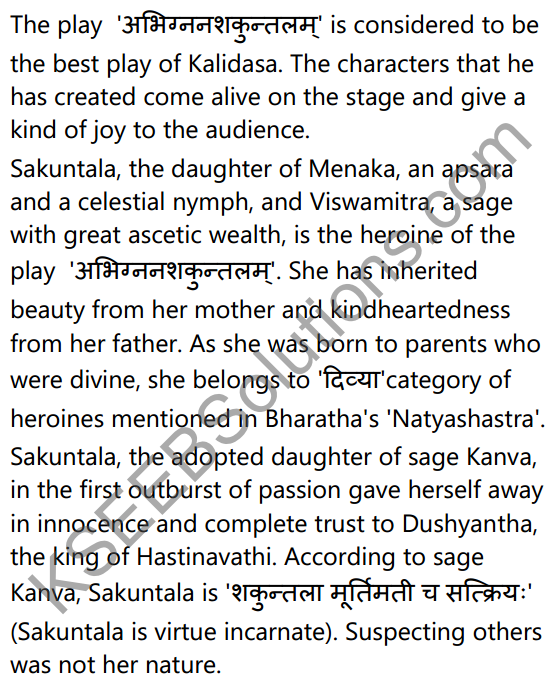
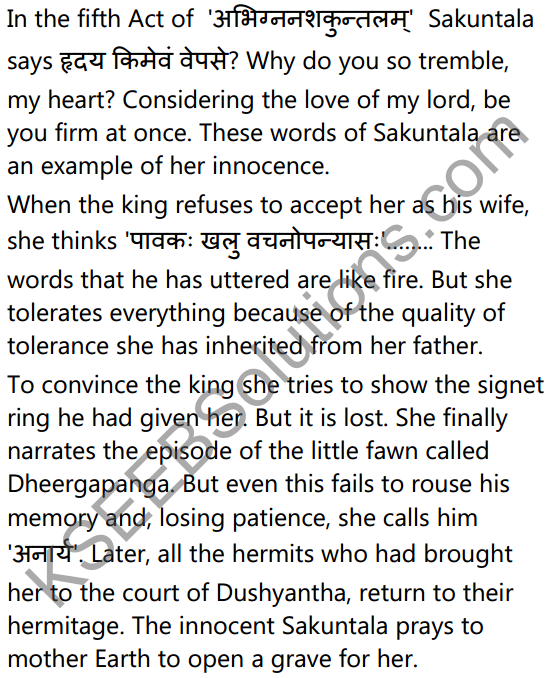
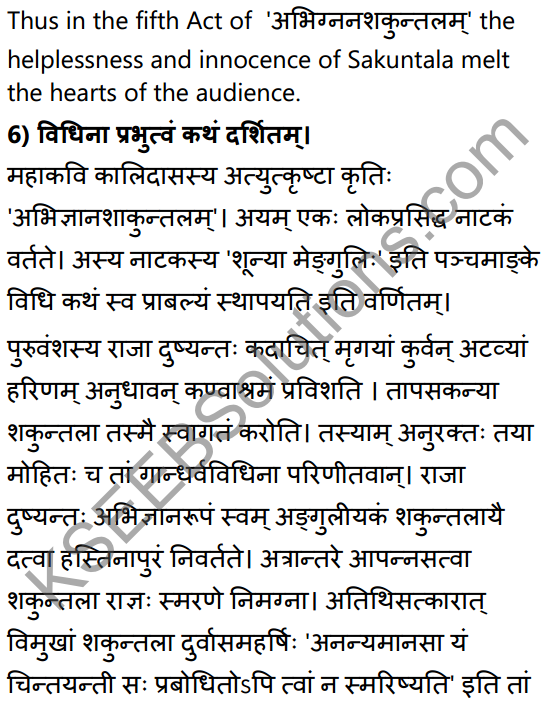
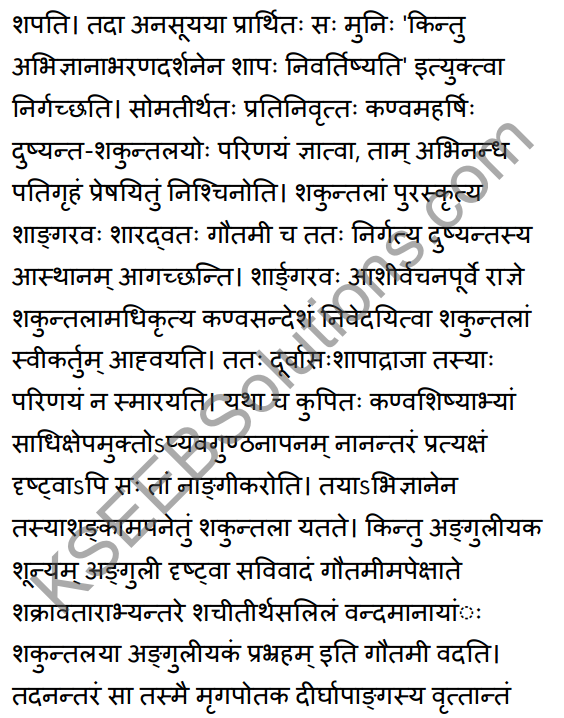
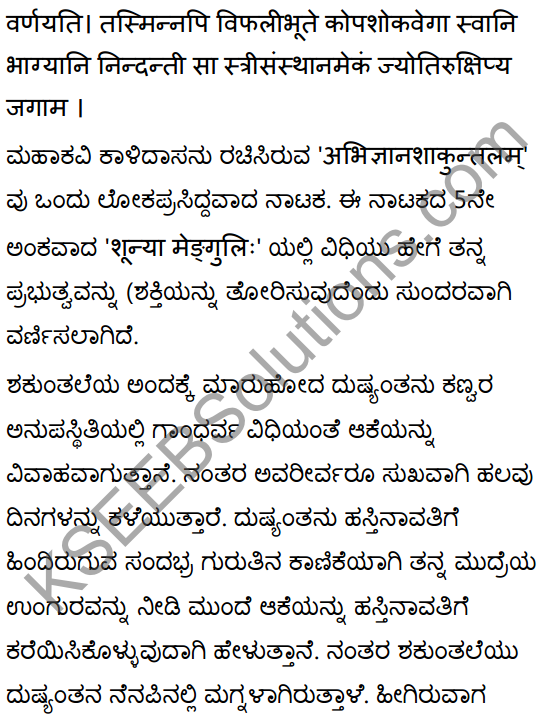
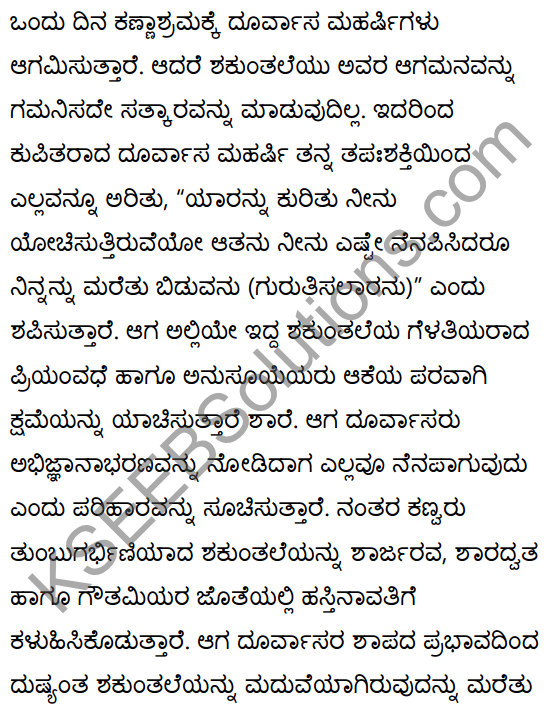
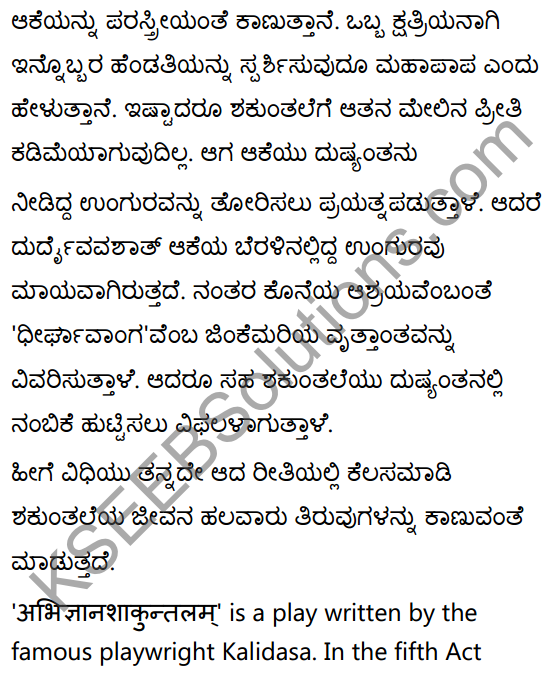
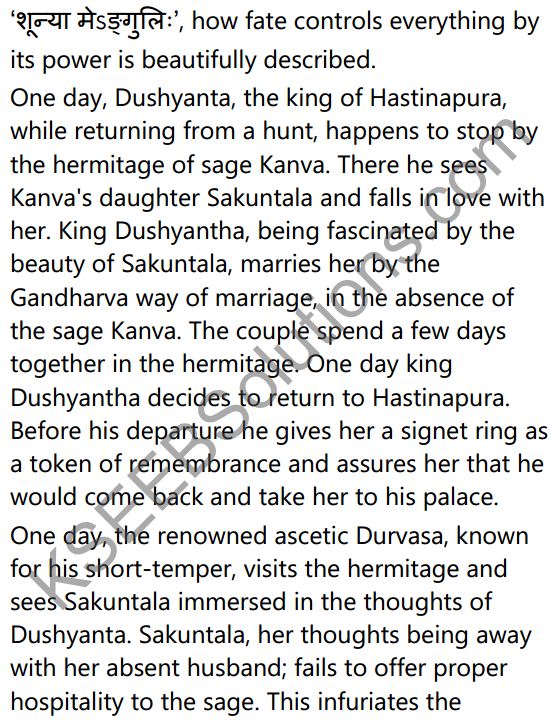
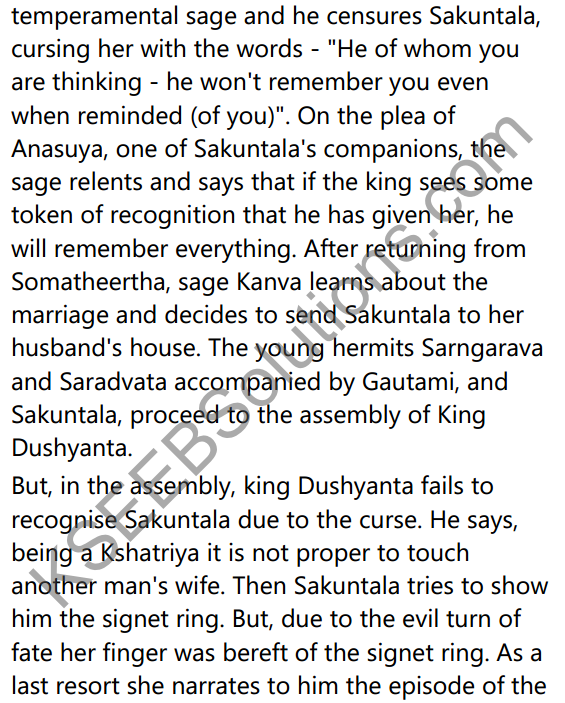
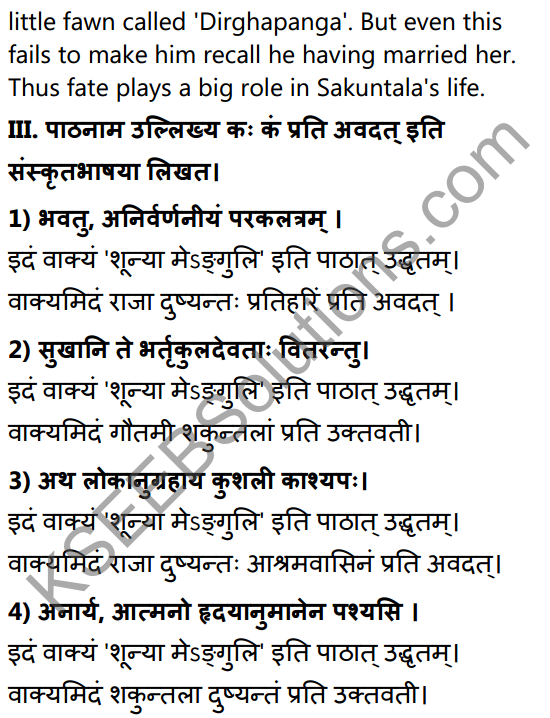
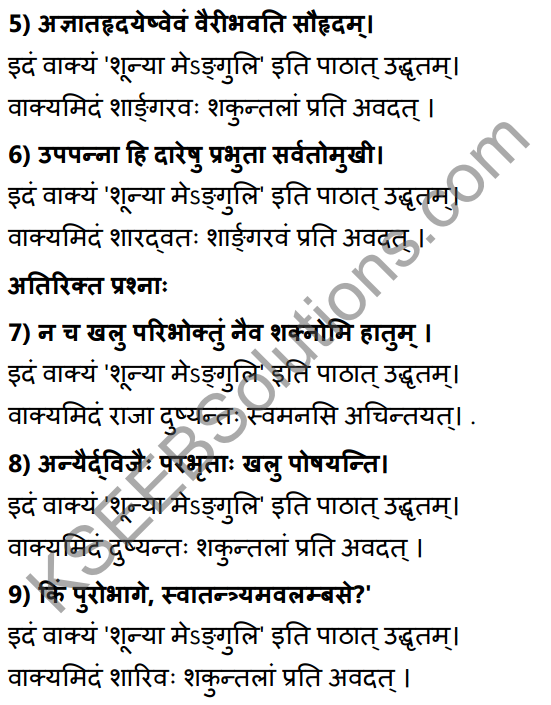
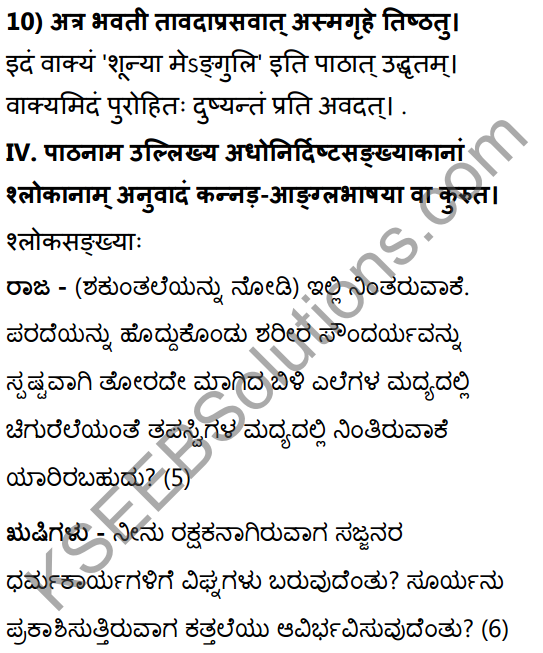
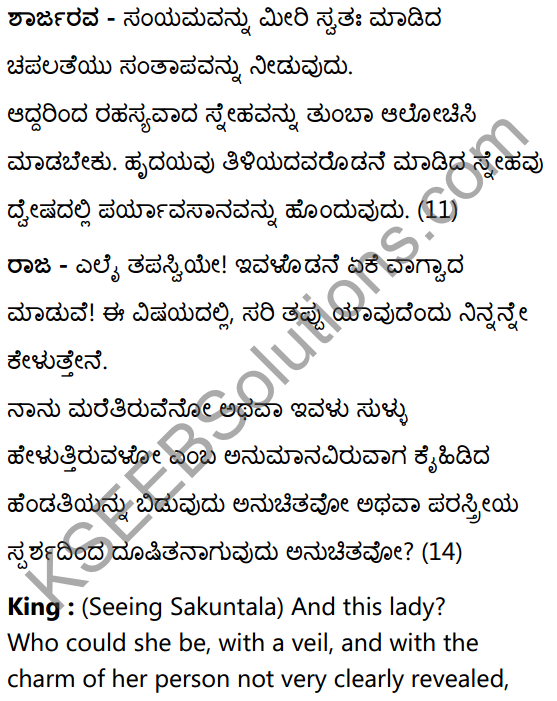
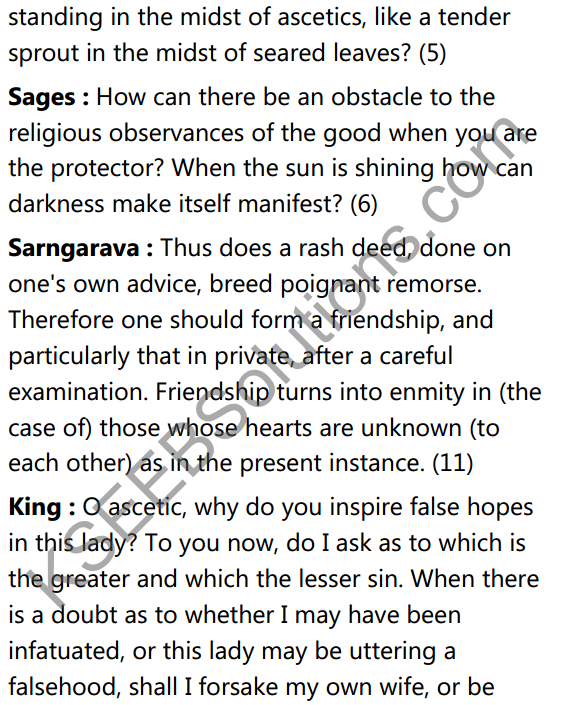
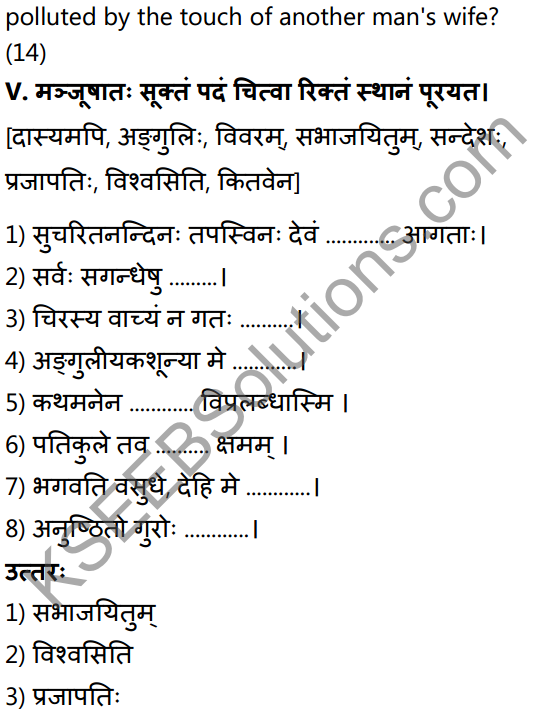
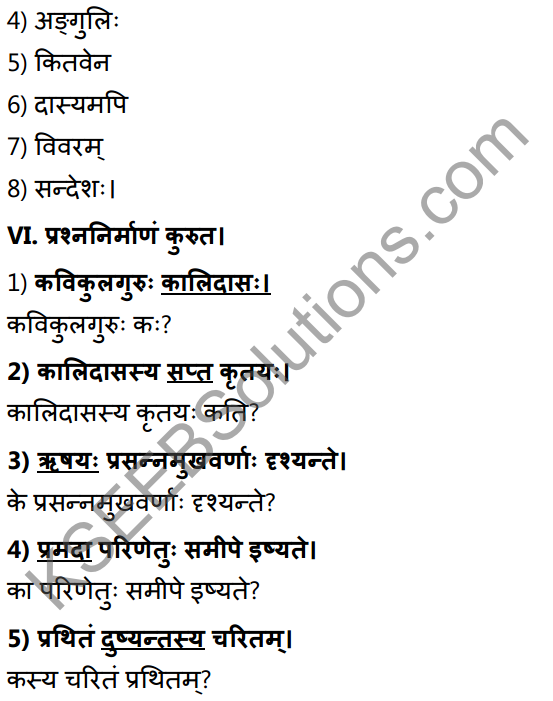
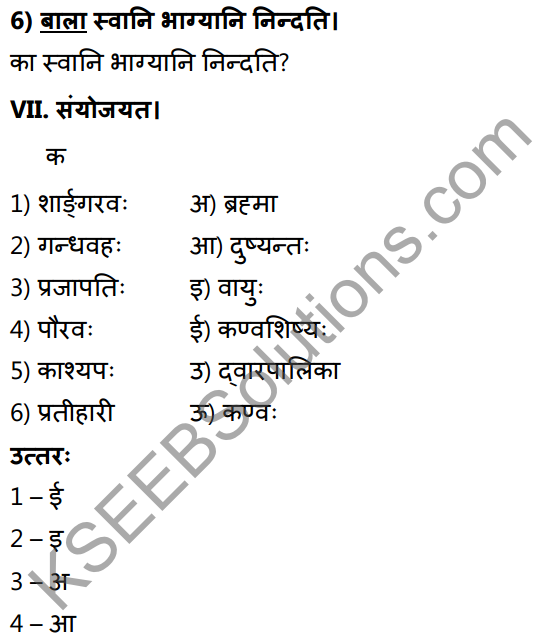

शून्या मेऽङ्गुलिः Summary in Kannada
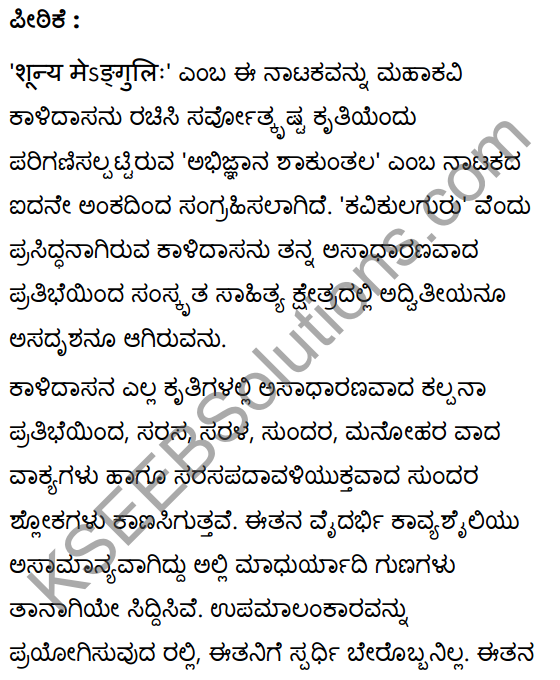
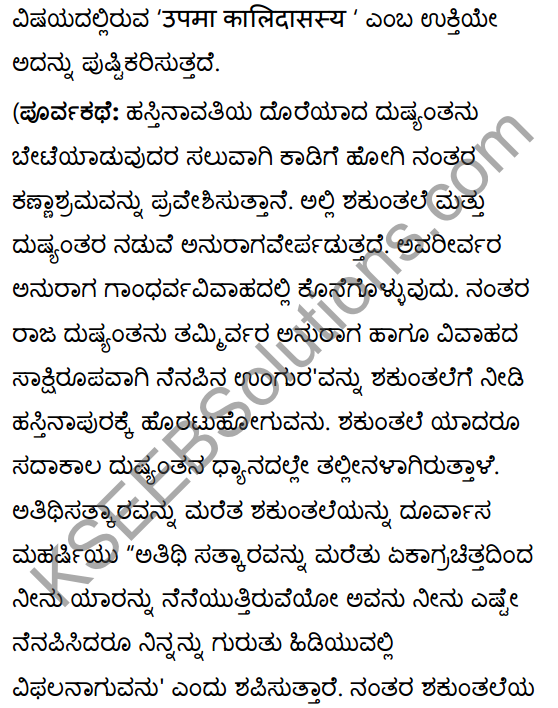
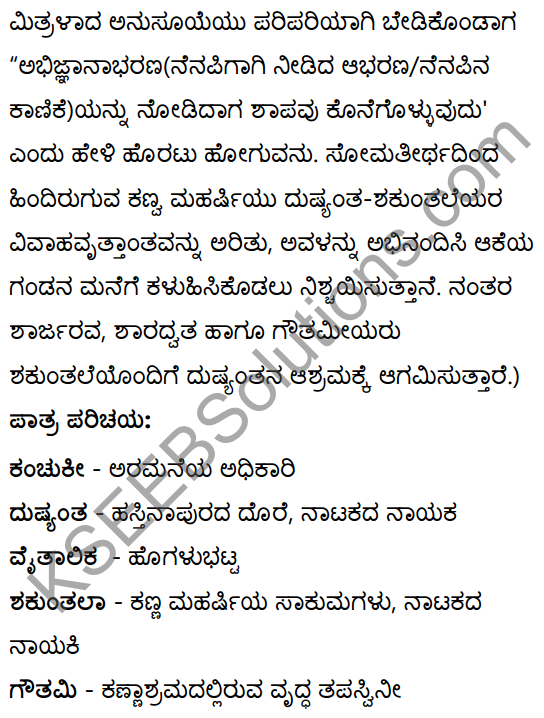
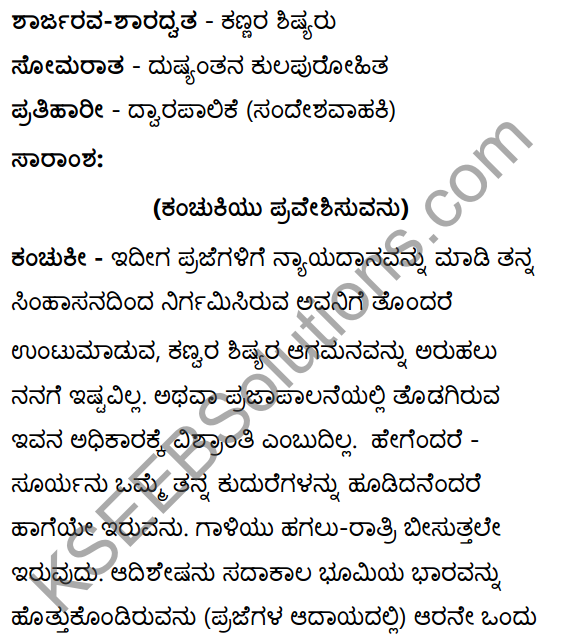
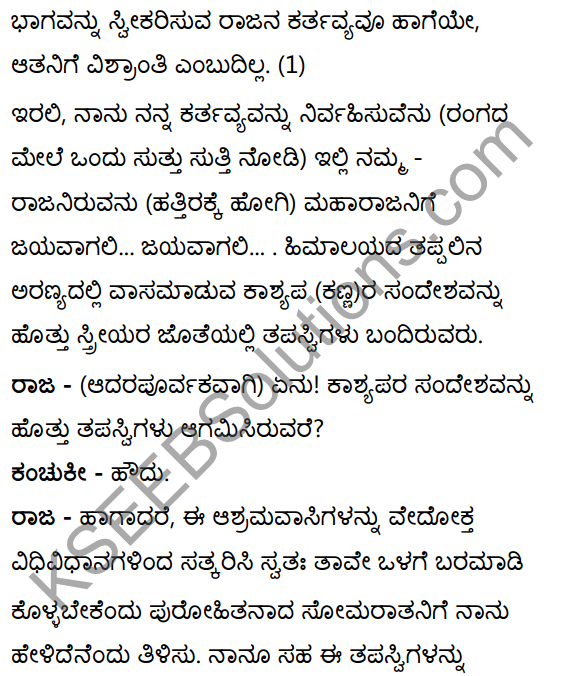
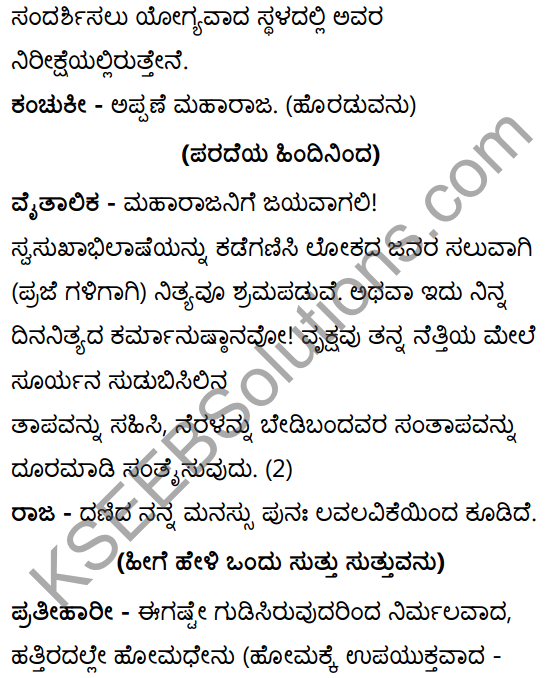
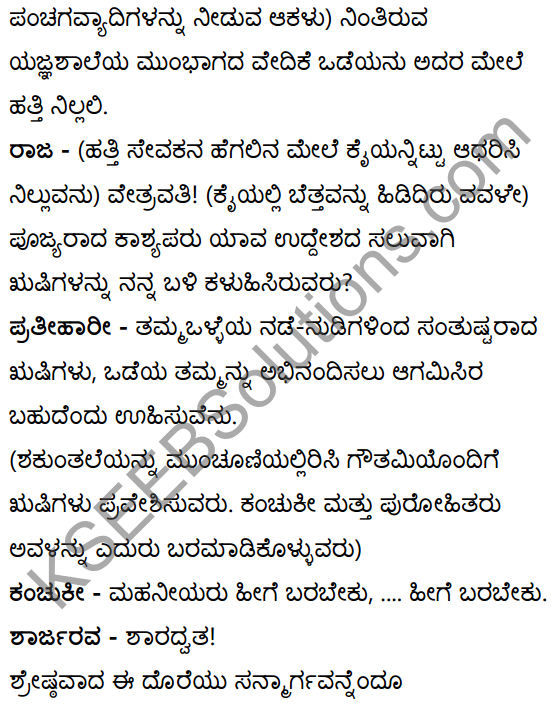
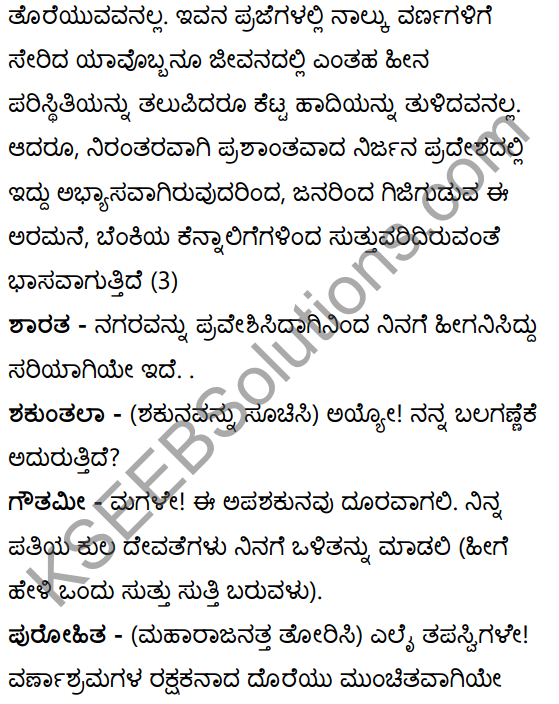
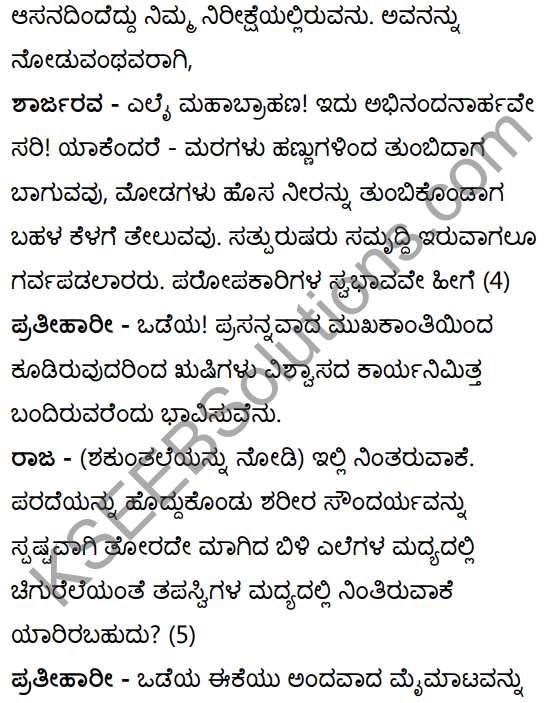
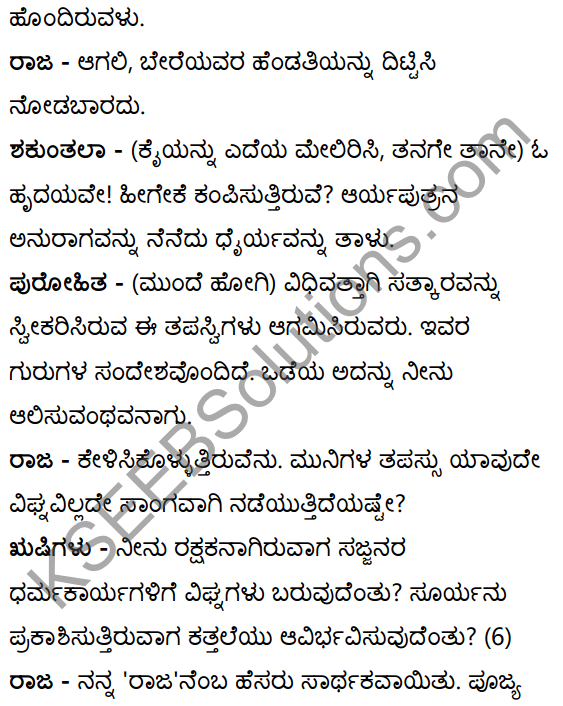
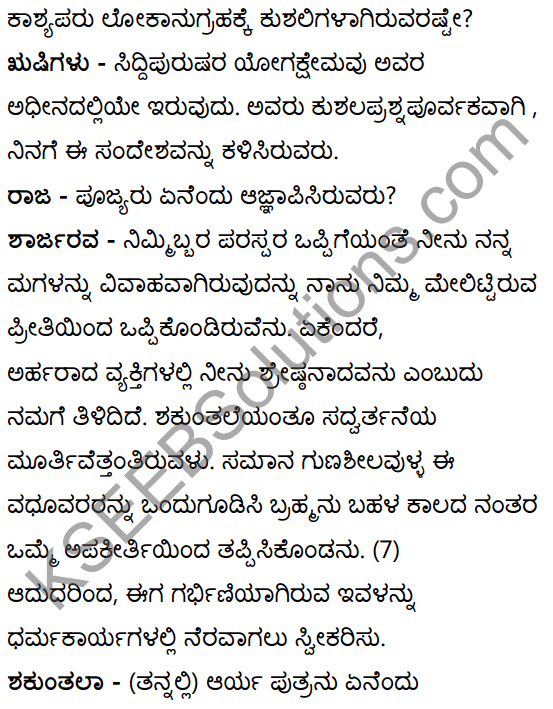
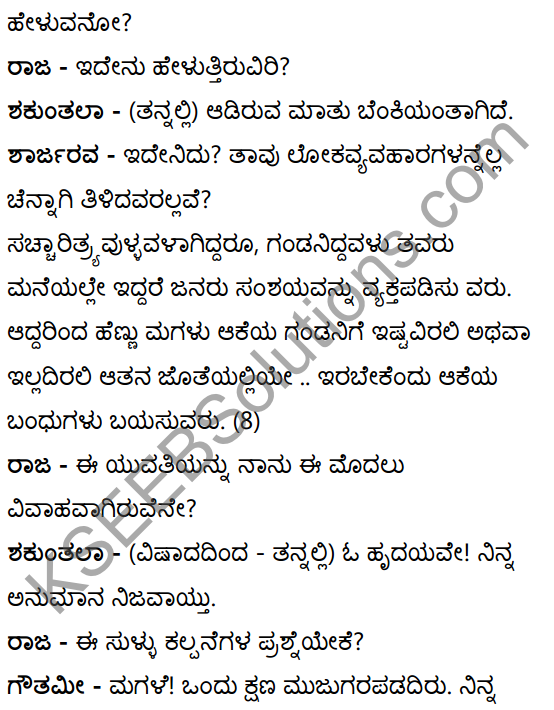
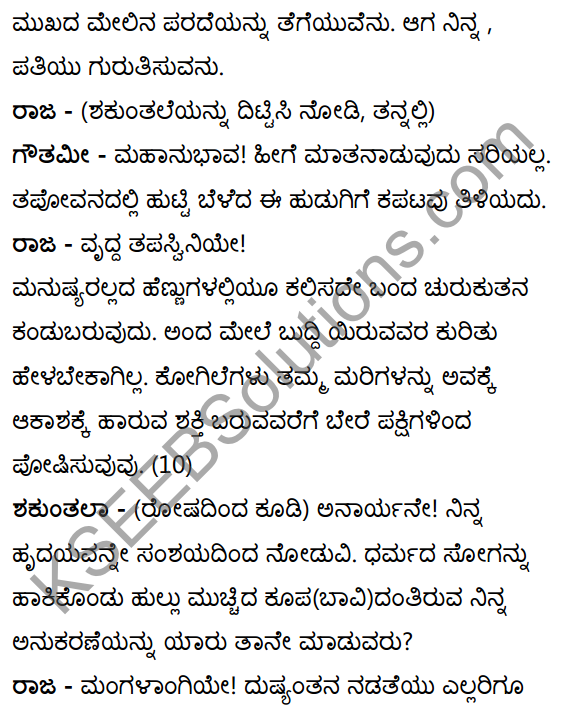
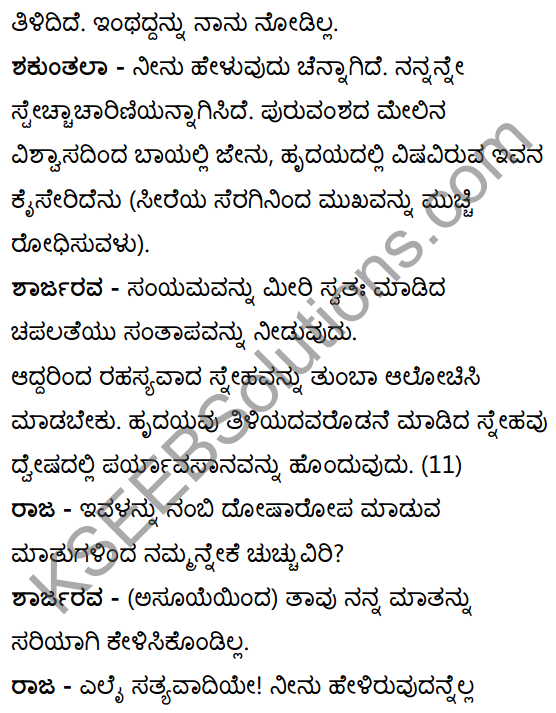
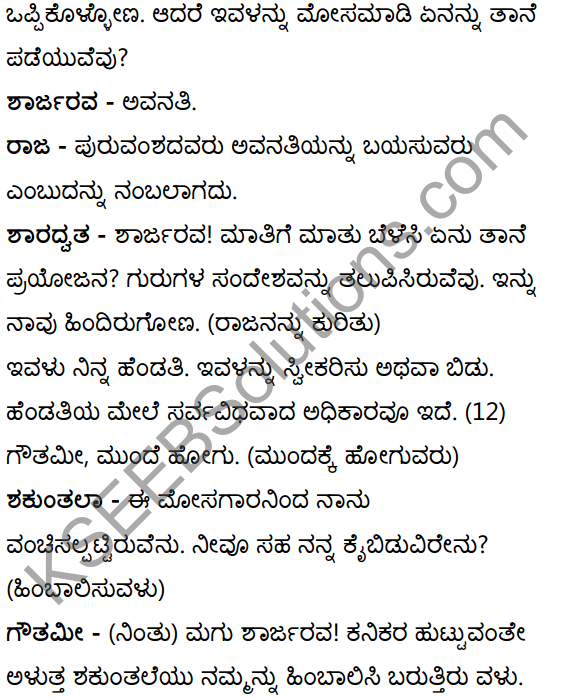
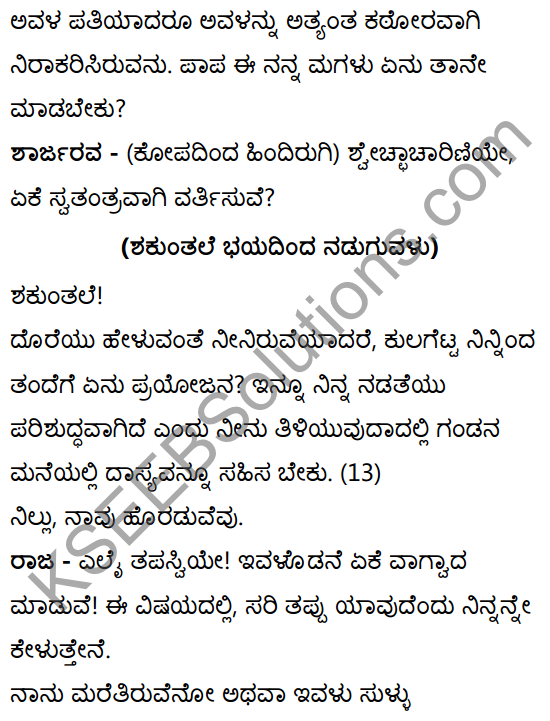
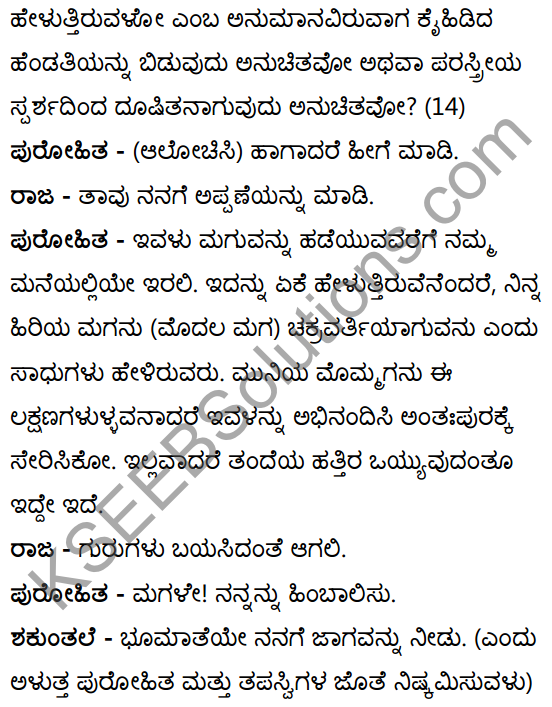
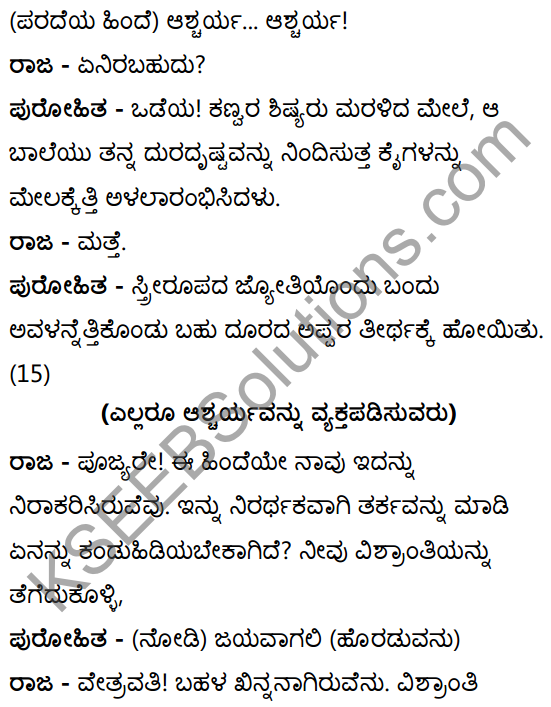
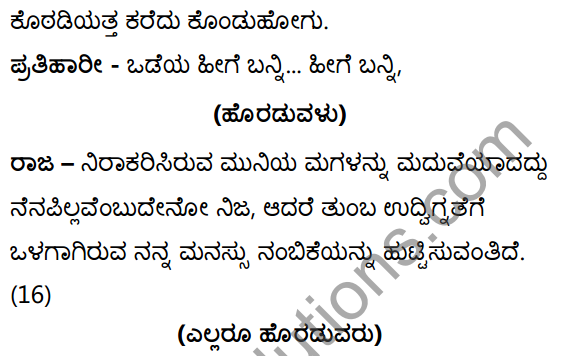
शून्या मेऽङ्गुलिः Summary in English
Introduction: The play, ‘शून्य मेऽङ्गुलिः’ is an extract from the fifth Act of the famous play ‘अभिज्ञान शाकुन्तलम्’ written by the great poet Kalidasa.
Kalidasa, who is famous as the master poet, has a unique position in the history of Sanskrit terature. Kalidasa wrote three plays. Among them ‘अभिज्ञान शाकुन्तलम्’ is generally regarded as a masterpiece. Kalidasa’s style is marked by simplicity and effectiveness of expressions. This is called the ‘वैदर्भी’ style. Simple diction, poetic rhythm, beautiful similes are the salient features of Kalidasa’s poetry.
(Background : One day, Dushyanta, the king of Hastinapura, while returning from a hunt, happens to stop by the hermitage of sage Kanva. There he sees Kanva’s daughter Sakuntala and falls in love with her. In the absence of sage Kanva they secretly marry by the Gandharva form of marriage. As a token of love, he gives her a signet ring and returns to Hastinapura. One day, sage Durvasa comes to the hermitage. Sakuntala, her thoughts being away with her absent husband, fails to offer proper hospitality to the sage. This infuriates the temperamental sage and he censures Sakuntala, cursing her with the words – “He of whom you are thinking – he won’t remember you even when reminded (of you)”. On the plea of Anasuya, one of Sakuntala’s companions, the sage relents and says that if the king sees some token of recognition that he has given her, he will remember everything. After returning from Somatheertha sage Kanva learns about the marriage and decides to send Sakuntala to her husband’s house. The young hermits Sarngarava and Saradvata accompanied by Gautami, and Sakuntala, proceed to the assembly of King Dushyanta.)
Dramatis Personae (Characters)
कञ्चुकी : The officer of the palace.
दुष्यन्तः : King of Hastinapura, the hero of the play.
वैतालिकः : The king’s bard.
शकुन्तला : Sage Kanva’s adopted daughter and heroine of the play.
गौतमी: A female ascetic in Kanva’s hermitage. शार्ङ्गरवः-शारद्वतः : Disciples of Kanva.
सोमरातः : The king’s spiritual guide,
पप्रतीहारी: The doorkeeper
Summary:
(Then enters the Chamberlain Kanchuki)
Kanchuki : I cannot make up my mind to announce to His Majesty, who has just left the judgement-seat, the arrival of disciples of Kanva which will again detain him. Or, this office of governing the people admits of no respite. For, The Sun has his steeds yoked once for all. The wind blows day and night. Sesha continually bears the burden of the Earth. And this is the duty of him that claims the sixth part (of the produce of land). (1)
So I will do my duty. (Turning and observing) Here is His Majesty –
(Approaching) Victory, Victory to Your Majesty! Here are some ascetics with some females, from the forest at the foot of the Himalayas bearing a message from
Kasyapa. Having heard (this) Your Majesty is to decide (what is to be done)
King : (Reverently) What! Ascetics with a message from Kasyapa?
Kanchuki : Yes, (my Lord).
King : Then request our priest Somarata, at my word, that he should himself introduce these hermits after having received them with Vedic rites. I too will await (them) here, in this place fit for the reception of ascetics.
Kanchuki : As Your Majesty commands. (Exit)
(Behind the Scenes)
Two Bards : May Your Majesty be victorious!
Bard : Regardless of personal comfort you daily toil for (the good of) the people. Or, such is indeed your daily course (of action). For the tree suffers burning heat on its head, (while) by its shade it allays the pain of those who seek shelter under him. (2)
King : Though wearied in mind, we have been refreshed (by these commendatory verses). (Turns round)
Door-keeper : Here is the raised veranda of the fire sanctuary, with the cow (that yields milk) for sacrificial purposes near it, and looking beautiful owing to its being newly cleansed. May your Majesty ascend it!
King : (Ascends it and stands supporting himself on the shoulder of his attendant) Staff-bearer, with what object can the revered Kasyapa have sent these sages to me?
Door-keeper : I think that the sages, pleased at your pious rule, have come to congratulate your Majesty. (Then enter the sages accompanied by Gautami, leading Sakuntala, before them; and in front of them the Kanchuki, and the Priest)
Kanchuki : This way, this way, holy Sirs!
Sarngarava : Saradvata,
This king, who swerves not from propriety, is, I admit, magnanimous (or, does not transgress the bounds of duty), nor does any one of the classes, even though occupying a lowly station (in life), take to (follow) the wrong path, still, with my mind long accustomed to solitude, I look upon this house thronged with men, as one encircled by the flames of) fire. (3)
Saradvata : It is but proper that you have become thus on your entrance into this city.
Sakuntala : (Gesticulating evil omens). Ah, why does my right eye throb?
Gautami : May all evil be averted, my child; and may the household deities of your husband’s family grant you happiness!
(Turns round).
Priest : (Pointing to the King) Hey Sages, there is the worthy protector of the (four) castes and the (four) orders (of life), who, having already left his seat, is awaiting you. Behold him.
Sarngarava : O mighty Brahmin, this is, indeed, commendable; still, in this matter we are. indifferent. For, Trees bend down with the rising (yield) of fruit; clouds hang very low when charged with new water; good men do not become arrogant by riches; this is but the nature of those who are benevolent towards others. (4)
Door-keeper : The sages appear to have bright expressions on their faces; (hence) I know that they have come on a peaceful errand.
King : (Seeing Sakuntala) And this lady?
Who could she be, with a veil, and with the charm of her person not very clearly revealed, standing in the midst of ascetics, like a tender sprout in the midst of seared leaves? (5)
Door-keeper : My Lord, her form appears to be lovely.
King : Well, it is not proper to gaze at another man’s wife.
Sakuntala : (Placing her hand on her bosom; aside). Why do you so tremble, my heart? Considering the love of my lord, be you firm at once.
Priest : (Approaching the King). Here are the sages honoured in due form. (They bring) some message from their preceptor. May it please Your Majesty to hear it.
King : I am all attention.
Sages : (Raising their hands). Be victorious, o King!
King : I salute you all.
Sages : May you attain your desires!
King : Are the sages unobstructed in (the performance of) their penance?
Sages : How can there be an obstacle to the religious observances of the good when you are the protector? When the sun is shining how can darkness make itself manifest? (6)
King : Verily, then, my kingly title is significant. Now, is the venerable sage Kasyapa doing well, that he may bless the world?
Sages : Those that have acquired super human powers have their welfare under their control. With inquiries after your health he thus addresses Your Highness.
King : What does His Reverence command?
Sarngarava : “By mutual agreement Your Honour married this daughter of mine; that act of both of you was approved by me. For –
You are known to us as the foremost of the worthy, and Sakuntala is virtue incarnate. It is after a long time that the Creator, (thus) bringing together a bride and a bridegroom of equal merit, has not incurred censure. (7)
So let her, who is now pregnant, be accepted for participation in religious observances.
Sakuntala : (Aside). What will my lord say now?
King : What is this that is being proposed to me)?
Sakuntala : (Aside). The words that he has uttered are (like) fire indeed.
Sarngarava : How is this possible? Your Highness is surely fully conversant with the ways of the world.
People suspect a woman, with her husband living, to be otherwise even though chaste, when exclusively residing in her kinsmen’s family. Hence her relatives desire a young woman to be with her husband, whether she is loved by him or not. (8)
King : What, was this lady married by me before?
Sakuntala : (With anguish, aside). Ah, my heart! Your misgivings have proved right!
Sarngarava : What, is this disgust for a deed done, or opposition to a (moral) duty, or a (conscious) disregard of things done?
King : Which means this question is based on a wrong assumption!
Gautami : Child, keep your bashfulness aside for a while; I shall just remove your veil; your husband will then recognise you. (She acts accordingly).
King : (Having closely observed Sakuntala; to himself)
Not deciding whether this beauty of unblemished loveliness, thus comes (to me), was or was not before accepted by me (in marriage), I am neither able to enjoy nor to abandon (it), like the bee, at dawn, on a kunda flower filled with dew. (9)
(Keeps reflecting)
Sarngarava : O King! Why do you thus sit silent?
King : O hermits, though trying to recall, I do not really remember having married this lady. How then shall I receive her, who is bearing visible signs of pregnancy, suspecting my relation towards her (in that case) to be that of a Kshetrin (i.e., a nominal husband)?
Sakuntala : (Aside). My lord casts doubt on our marriage. Where can now be my lofty aspiration?
Saradvata : Sarngarava, stop your speech. Sakuntala, we have said what we had to say. His Honour here has spoken in the way you heard. Let a convincing reply be given to him.
Sakuntala : (Aside). What good, indeed, will a reminder do, when that sort of love has undergone such a change? It is now settled that I have to deplore my fate. (Aloud) My noble Lord! – (Checking herself). Where marriage is doubted, this is not the proper form (of address). O descendant of Puru, it is indeed not becoming of you, having at first in that manner deceived this person, naturally simple-minded, after a formal agreement in the hermitage, thus to disown her now!
King : (Closing his ears) Heaven forbid!
Sakuntala : Well, if you really think me to be another’s wife, I will remove your doubt by showing you this token of recognition.
King : (That is) a nice proposal.
Sakuntala : (Feeling her fingers). Alas! My finger has no ring on it! (Looks at Gautami, sorrowfully).
Gautami : Surely your ring must have dropped down as you made your obeisance to the water of Sachitirtha at Sakravatara.
King : (Smiling) This is (i.e., Here is an instance of) what is said (- the proverb -) “Ready is the wit of womankind”.
Sakuntala : Here, indeed, Fate has asserted itself (shown its power). I will relate to you another convincing incident.
King : Now it has come to something to be heard.
Sakuntala : One day, when we were in the Jasmine bower, you had in your hand water in a vase of lotus-leaves.
King : I am attentive proceed).
Sakuntala : Just at that moment the little fawn, named Dirghapanga, my adopted son, came up. You felt pity towards it and said, “Let him drink first”, coaxed him to drink the water; but, not being familiar with you, he did not come close to your hand. He however drank the same water, when afterwards it was taken by me in my hand. Then you said in jest, “Everyone trusts one’s own kindred; both of you here are foresters.”
King : Lustful men alone are allured by such and other honeyed words, full of falsehood, of women seeking to encompass their own ends.
Gautami : Worthy Sir, you should not say so. Brought up in a hermitage, this person (i.e., Sakuntala) is unacquainted with deceit.
King : Old ascetic woman,
Intuitive cunning of the womankind is seen (to exist) (even) in females other than human. What then in the case of those that possess power of understanding (or, knowledge)? The female cuckoos, indeed, cause their offspring to be reared by other birds, before they can fly into the sky. (10)
Sakuntala : (Wrathfully). O wicked one, you judge after the manner of your own heart! Who else (among men) will act (so basely) as you, putting on the garb of virtue and resembling a well covered over with grass?
King : (Aloud). Noble lady, Dushyanta’s conduct is well known; but I do not see this (i.e., deceitfulness).
Sakuntala : Deservedly, indeed, have I been made (to appear) a wanton woman who, through faith in his ancestry (meaning the line of Purus) fell into the hands of one who has honey on his tongue (literally in his mouth) but poison in his heart! (Covers her face with the end of her garment and weeps).
Sarngarava : Thus does a rash deed, done on one’s own advice, breed poignant remorse. Therefore one should form a friendship, and particularly that in private, after a careful examination. Friendship turns into enmity in (the case of) those whose hearts are unknown (to each other) as in the present instance. (11)
King : O Sir, why do you, merely relying on this lady, wound us with words implying a number of accusations? but then, what is to be gained by deceiving this (woman)?
Sarngarava : Damnation!
King : It cannot (for a moment) be believed that the Pauravas seek their downfall!
Saradvata : Sarngarava, what is the use of talking so much? We have executed the preceptor’s order. Let us now return.
She is, then, your wife; receive her (into your house), or forsake her. For, authority over a wife is admitted to be absolute. (12)
Gautami, lead the way. (They set out).
Sakuntala : How have been deceived by this perfidious man; and you, too, abandon me? (Follows them).
Gautami : (Stopping) Dear Sarngarava, here is Sakuntala following us, lamenting piteously. Her husband having cruelly repudiated her, what can the poor girl do?
Sarngarava : (Turning back in anger). What, wanton girl, would you seek independence? (Sakuntala trembles, frightened).
Sarngarava : O Sakuntala,
If you are as the King says, what can the father do with you who is a disgrace to his family? But if you believe your conduct to be irreproachable, even servitude in the husband’s family is proper for you! (13)
Stay here. We go away.
King : O ascetic, why do you inspire false hopes in this lady? To you now, do I ask as to which is the greater and which the lesser sin. When there is a doubt as to whether I may have been infatuated, or this lady may be uttering a falsehood, shall I forsake my own wife, or be polluted by the touch of another man’s wife? (14)
Priest : (Reflecting). If so, let us do one thing.
King : Command me, Your reverence.
Priest : Let the lady stay in my house (till delivery). If you ask why I propose this – You have been told by the sages that at the very first you will beget a son destined for imperialty. If the grandson of the sage be possessed of the signs indicative of it (i.e., imperialty), you will, with felicitations, admit her into your harem; if it turns out otherwise, to take her back to her father is just the course left.
King : As it pleases my worthy preceptor!
Priest : Follow me, child!
Sakuntala : venerable Earth, open a grave for me. (lit. give me an opening) (Starts weeping) (Exit with the Priest and the Sages.)
(Behind the Scene)
Miracle, Oh, miracle!
King : (Listening). What could it be?
Priest : (Entering). (With amazement). My lord, a veritable miracle has happened!
King : What is it?
Priest : My lord, when the disciples of Kanva had departed, the girl, reproaching her fortune, began to cry aloud, tossing up her hands
King : And then?
Priest : And immediately, in the vicinity of Apsarastirtha, a flash of light in a female form lifted her up and vanished. (15)
(All express their astonishment)
King : Holy sir, even before, we had rejected the thing. What is (now) to be sought by useless conjectures? Let Your Reverence take rest.
Priest : (Looking at the King). Be victorious! (Exit]
King : Vetravati, I am quite bewildered. Lead the way to the bed-chamber.
Door-keeper : This way, my lord. (Sets out).
King : True that I do not remember this daughter of the sage, (now) repudiated, as having been married by me. But my heart, being agitated, makes me believe (her to be so) as it were. (16)
(Exeunt Omnes)
